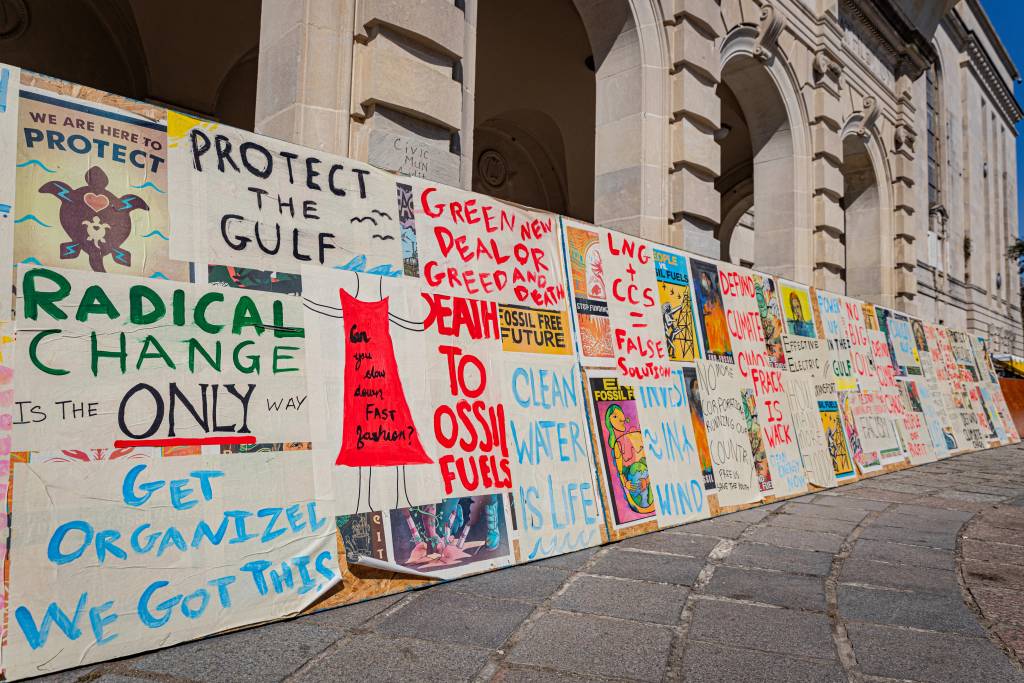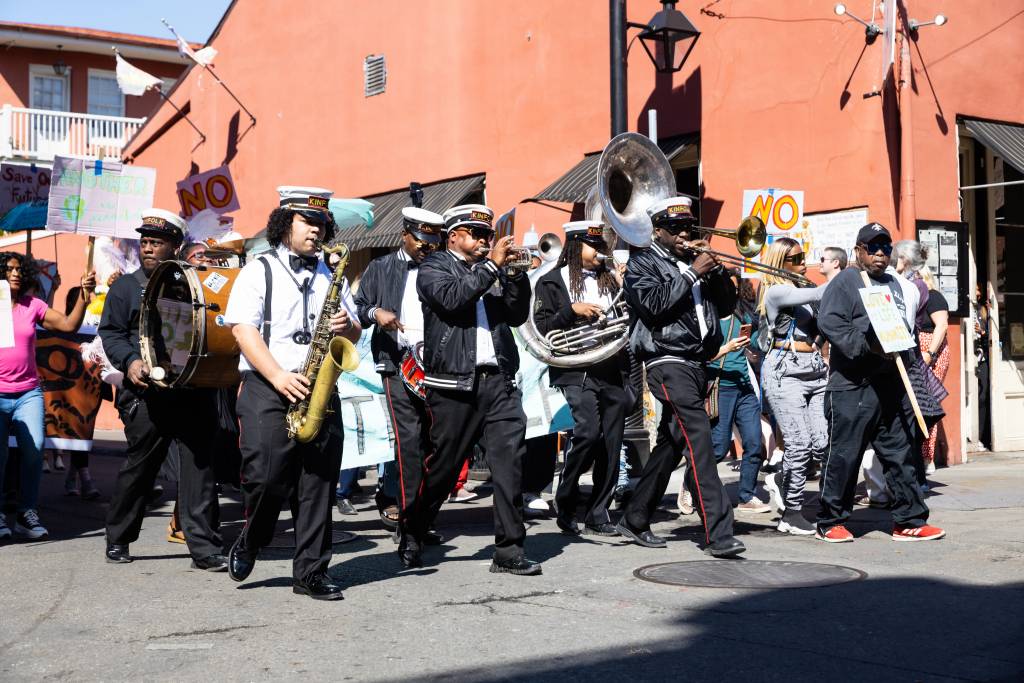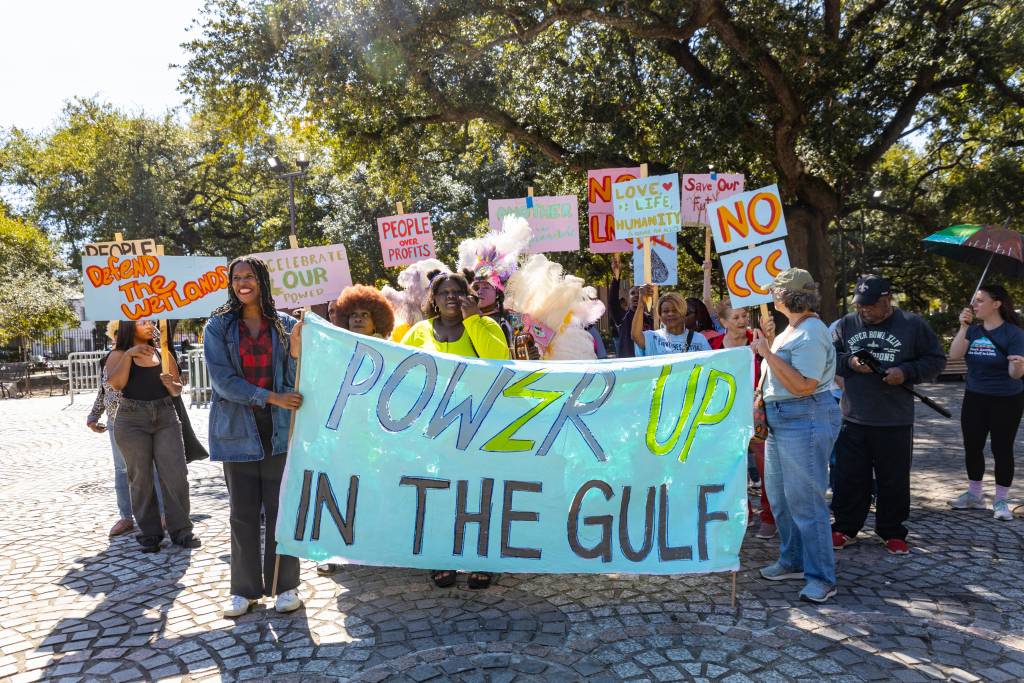Power Up comes to the US Gulf Coast
New Orleans, USA— Perhaps now more than ever, we have to ask ourselves: why should it have to be so radical to declare, “we are here” ?
The U.S. Gulf Coast has long been treated by the fossil fuel industry as a sacrifice zone, a place to put all their toxic, climate-destroying production as though no one lives there. These companies are so committed to that mirage that the renderings they submit of their building plans show empty land rather than homes. Every time they submit a proposal for a new plant, that proposal quite openly declares: no one lives here.
But they do.
And alongside calls for specific community-centered climate solutions, that is what Power Up in the Gulf declared: despite everything, despite centuries of dehumanization and violence, people have lived here, people have thrived here, a rich culture has bloomed. You cannot take that away, and it’s time that we make decisions for this region that reflect what this region wants: health, safety, the right to live and thrive in their home.
None of this is new. “These power and petrochemical plants are the new plantations in the American South,” said Sheila of Louisiana Bucket Brigade on a tour of the river parish region nicknamed “Cancer Alley.”

Pictured: community art made for Power Up in the Gulf at “Studio Be” in New Orleans
More than just “Cancer Alley”
Power Up in the Gulf welcomed people of all ages into the climate movement, celebrating the community power and joy of the Gulf while engaging attendees in conversations about the harmful effects methane gas production and exportation plants have on people and the planet. Hosted by 350.org, the event kicked off at 11 a.m. with a joyful Second Line march downtown calling on the government to end corporate subsidies, stop all —old and new— fossil fuel projects, and to usher in real and just climate solutions for the Gulf and the world.
After the March, hundreds gathered in New Orleans’ historic Congo Square for a day-long celebration of community power, resistance, and climate solutions. The celebration declared quite definitively that the Gulf is not “just” a sacrifice zone: attendees ate food from local vendors. Children got their faces painted and played in bouncy houses. The activist corner was powered by free microgrids provided by local partner Footprint Project. Local NOLA-based Comedian Kamari Stevens, MC’d the event. Attendees danced to music from three Gulf artists: Big Freedia, Mannie Fresh, and HaSizzle, who have helped grow and spread bounce music, which is New Orleans’ own unique hip hop music that is said to have originated as early as the late 1980s in the city’s housing projects.

Pictured: Kinfolk brass band performs during the Second Line March in New Orleans

Pictured: Frontline communities and partners gather in Congo Square for the Second Line March
Roishetta Ozane to Fossil Fuel CEOs: “We Are Not Your Sacrifice”
“We want to send a message that it is time to put funds into communities that are disproportionately impacted by the decisions made by the government. In New Orleans we are coming together as frontline folks from along the Gulf Coast to say to fossil fuel companies and the government that we are NOT your sacrifice.” said Roishetta Ozane of the Vessel Project of Louisiana based in Lake Charles, LA. “I am doing this as a mother. I have six children, some of my children have asthma. We are no longer talking about generations far away. The people we are trying to save are here now. And today we are also showing the world why we love this place, why we fight for this place, why we love the Gulf Coast.”
Power Up in the Gulf was co-hosted by the Vessel Project of Louisiana and 350.org, and it was sponsored and co-planned by many partner organizations fighting for climate solutions for the Gulf: 350 New Orleans, Louisiana Bucket Brigade, Sunrise Movement New Orleans, Eternal Seeds, stand.earth, Healthy Gulf, 2030 Fund, People over Plastics, All 4 Energy, Earth Justice, Hip Hop Caucus, Rainforest Action Network, Power Coalition, and the Sierra Club. Frontline speakers included Roishetta Sibley Ozane, Kami and Kamea Ozane, Founder and Director of the Vessel Project; Breon Robinson of Healthy Gulf; Louisiana Public Service Commissioner Davante Lewis; Joy Banner of the Descendents Project; Big Chief Beautiful, Debra Sullivan, Lois Malvo, and Paul Geary of Concerned Citizens Table of Lake Charles.
Power Up in the Gulf was one of our 200 actions taking place worldwide over the coming month, creating a global drumbeat building up to the UN climate talks, calling on world leaders to power up a renewable energy revolution. The end event of this month-long initiative will be the “Global Day of Action” scheduled for 9 December, during COP28.
Learn More:
For more on the Vessel Project of LA, co-host of Power Up in the Gulf, go to https://www.vesselprojectoflouisiana.org/
For more on Power Up across the globe, go to globalpowerup.org